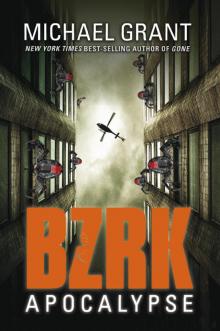- Home
- Michael Grant
Front Lines Page 8
Front Lines Read online
Page 8
Rio thinks, We’re soldiers now.
8
RAINY SCHULTERMAN—NEW YORK CITY, NEW YORK, USA
“Women soldiers are an abomination!”
Rainy turns to look at the source. There is a group of perhaps twenty people, mostly women, holding signs reading Eve is not Adam!!! and 1 Timothy 2:12. Suffer not a woman to teach, nor to usurp authority over the man, but to be in silence!!!
She doubts even the Christian Bible comes with that many exclamation points, and she toys with the idea of offering her own favorite verse from the Torah, Judges 4:21: “But Jael the wife of Heber took a tent peg, and took a hammer in her hand, and went softly to him and drove the peg into his temple, till it went down into the ground . . .” But she thinks better of it. A future in military intelligence does not begin with picking fights in train stations.
On the platform she tries to hear the garbled announcements from the public address, but it’s as noisy as a fair, with farewells all around her and the hissing of steam engines and the shouts of false gaiety from nervous and excited soldiers.
She can hardly bear to look around her. So much sadness and worry from so many little family groups, so many mothers with tears, and so many fathers struggling not to reveal any emotion at all. It’s a sea of olive drab and khaki, white handkerchiefs held to red noses, pink ribbons tied around newspaper-wrapped food parcels, coral lipstick on the lips of girlfriends; but these sprinkles of color only seem to accentuate the grayness of it all, the gray coats and shabby graying dresses, and gray-green fedoras pulled low, and gray abashed faces of men who are seeing off girlfriends for the first time in history.
Girl and women soldiers are going off to war, wearing pants and boots, shouldering heavy packs and duffels. Some are at the end of their leave after basic training, heading off to deployments in places whose names will be excised from their letters home by the censors. Some are home on leave from Britain or Australia.
It can’t ever have been easy, Rainy thinks, not any war. But the rituals are different now. It has always been that the men went off and the women wept and waved. There is no blueprint for what is happening now. There is no easy reference point. People don’t know quite how to behave, and it’s worse for the men in the station who are staying behind and feel conspicuous and ashamed.
She sees belligerent, defensive looks even as men hug their uniformed sweethearts. She sees looks of dark suspicion aimed at male soldiers when they acknowledge their fellow female soldiers with a grin or a handshake or a clap on the back.
It is all worth noticing, worth considering, Rainy believes. It is all a part of this war. It’s all a small part of something unimaginably huge. Millions are dead already, millions more will die; she is grimly certain of that. She has never really accepted the notion that the arrival of the Americans will end things in a few months. Rainy can read a map, and she has seen how much of the world now lies beneath the flag with the swastika.
Rainy has insisted on coming alone to the station, fearing the flood of parental emotion that would weaken her determination. She’d already been through that when she first enlisted, and when she went off to basic training, and now she’s heading to this intelligence school for still more training, after which . . .
Well, after which no one knew for sure. Everyone says America is ready, finally, to go up against the Germans. Marines are already fighting the Japanese, but despite the special rage and hatred people felt for the Japanese, Rainy knows the Germans are the greater danger.
Aryeh can kill Japanese; Rainy wants to kill Nazis. They are the great enemies of humanity; they are the cancer on civilization. The German armed forces—the Wehrmacht—has already destroyed vast armies, conquered millions of square miles. They have deliberately starved hundreds of thousands at Leningrad. The German air force—the Luftwaffe—has slaughtered tens of thousands of civilians in Poland and in England. The German navy and its vicious submarine wolf packs have littered the ocean floor with ships and the bones of sailors.
It is the Germans, the Nazis, who have enslaved millions of French, Dutch, Poles, Czechs, Danes, Belgians, Ukrainians, and others.
It is the Nazis who force Jewish children into camps in Poland and Russia.
Why hasn’t Cousin Esther written? Why has no one gotten a letter from any Jew in Nazi-occupied territory?
Rainy does not expect to fire a weapon in anything but training, but intelligence work can be as deadly to her foe, and the Nazis are her foe, her personal foe. She will remember—she has ordered herself to remember—that each day she performs her duties well will contribute to destroying that enemy.
And saving the world.
That thought coaxes a small smile from her. All by yourself, Rainy? She mocks herself. Will you destroy Hitler and his empire of hate?
“If I get the chance,” she whispers.
Finally she hears her train being called, snatches up her bag, and pushes her way through the crowd. It’s a long train behind two huffing black engines leaking clouds of steam, and it takes her a while to find her assigned compartment. She’s the second to get there, behind a civilian woman with a vast handbag stuffed with salamis and wilting flowers.
“Ma’am,” Rainy says respectfully, and takes a window seat. The woman glares at her and pulls her bag closer, as if fearing Rainy will take something.
Three young male soldiers pile in—the compartment can hold eight if no one breathes too deeply. They’re either drunk very early or drunk very late, depending on whether they’ve gone to bed.
“Hey, it’s a girl!” one of them says, and flops fragrantly beside her. They’re all privates; no insignia of rank yet adorns their uniforms.
“You sure that’s a girl? Don’t look like no girl. Looks like a . . .” And there his verbal abilities fail him, and he trains unfocused eyes on Rainy before slumping back, unconscious.
A conductor is pushing his way down the jammed and noisy corridor, leading a male officer. He reaches the door to the compartment, holds it open, accepts a tip, and, as he closes the compartment door, slides down the roll-up blind.
Rainy watches the officer, a first lieutenant. The lieutenant watches her right back, takes in the three drunks and the civilian woman, and sits opposite Rainy.
The two more-conscious soldiers immediately attempt to straighten themselves up, adjusting caps and in one case making a valiant but doomed attempt to align buttons with their proper holes.
It is unusual, to say the least, to have an officer sitting here in the cheap seats. Maybe the train is overloaded. But no, this officer was guided here.
“Lieutenant,” Rainy says, and nods. Protocol does not call for saluting in this situation.
The lieutenant makes a show of reading the name tag on her uniform. “Schulterman, is it?”
“PFC Rainy Schulterman, sir,” Rainy acknowledges.
He smiles. It’s not a leer, nor is it a friendly smile. It’s a practiced smile. He’s carrying only a briefcase, no duffel. His boots are shined; his uniform is crisp. He’s perhaps twenty-five, with watery-blue eyes behind glasses, blond hair, scrubbed pink skin, thin lips and shoulders. He’s a crease-checker, one of those men who reach compulsively to pinch the crease in his trousers, making sure it stays straight, that it stands tall above the thigh before being flattened by the pressure of the kneecap.
“Where you headed, PFC?”
“South, sir.”
“Just south?” Again, the practiced smile. “That covers a lot of ground.”
“Yes, sir.”
He considers this, and the train jerks as the big steel wheels engage. The platform and its waving, weeping population slide away, made to look like a dreamscape by the wreaths of steam.
“Girl like you, I guess you’re headed to Fort Ritchie, right?” He waits a beat for an answer and gets nothing. “It’s all right, Private, we’re on the same side.” He laughs confidentially. “I swear I won’t tell a soul.” He makes the sign of the cross over his heart.
&nb
sp; “Is that where you’re heading, Lieutenant?”
He pretends not to hear.
The passed-out drunk is sliding as the train moves, feet beneath the seat, knees extending, back slipping; he’ll be on the floor as soon as they hit a turn.
The officer pulls a pack of cigarettes from his chest pocket. He taps one halfway out and offers it to Rainy.
“No thank you, sir.”
“Don’t smoke?”
“It seems a bit . . . close . . . in here,” Rainy ventures.
“Do you mind if I . . .” He holds a cigarette hovering near his lips.
“Not at all, sir,” she says. She does mind, but she’s not going to chide a military intelligence officer. That is of course what he is, she has no doubt of that, despite the lack of any revealing insignia.
He lights his cigarette and blows a blue cloud. “What do you think of all this, if you don’t mind my asking, Private?”
“All what, sir?”
He shrugs and waves the cigarette in an arc encompassing the compartment and perhaps more. “Must be strange, being a girl and all.”
“No, sir. I’ve been a girl my whole life.”
It’s the kind of response that walks right up to the line of being a smart-ass answer. The lieutenant’s grin is quick and genuine this time. “Yeah, I guess it’s not so bad for some girls. You might meet a nice fellow.”
Rainy doesn’t answer.
“You’re not so talkative, are you, Private?”
Rainy manages a tight smile, and this seems to encourage him. “Well, maybe I haven’t introduced myself properly. Lieutenant Janus. Heading to Pittsburg myself. I’m in supply and logistics there.”
Sure you are.
“Pleasure to meet you, sir.”
The sharp, jerking movement comes as they clear the station and accelerate, and sure enough the passed-out drunk slides toward the floor. Rainy leans forward and lays a hard tap with the edge of her hand on his knee. He jerks awake just long enough to curl himself sideways and avoid sliding all the way.
The civilian woman does not approve of any of this. The other two privates are leaning into each other, having the kind of very intense conversations men sometimes have when inebriated. The topic appears to be a friend who’s been rated unfit for service, 4F, and whether or not he’s a wolf who will be going after their girls ten seconds after the train is out of the station. Also, beer. And something to do with some jackass sergeant who . . .
They suddenly recall that there’s an officer present and fall silent.
“May I ask what attracted you to supply and logistics, sir?” And again the question is absolutely respectful and cheeky at the same time.
“Mostly the logistics,” he says solemnly. He’s beginning to suspect she’s playing with him.
“Yes, sir. I’ve never been entirely clear on what that involves.”
He does not offer to enlighten her. “You from here in New York City?”
“Well, that’s where I caught this train, sir.”
“Family?”
“Yes, sir.”
“Mother? Father?”
“One of each, sir.”
“I don’t suppose they’re happy seeing you dragged into this stupid, pointless war, eh?”
“I wasn’t aware that the war was stupid. Or pointless.”
A long drag on the cigarette. A crease check. “Well, it’s not our war, is it? Why should we be fighting to save Britain from the Germans? Let alone the Russians, those Bolshevik, Commie bastards. Tell me, Private: why should we be fighting for a dying colonial empire and a dangerous totalitarian state?”
Rainy takes a moment to consider the correct answer. “Because that’s what the chain of command has ordered us to do, sir.”
Check. And mate.
He sees it now. He sighs. “I’m going to see if I can get some fresh air. You’re right, it’s rather close in here. Join me, PFC Schulterman.”
It’s not a request. Rainy stands up and follows him into the still-jammed corridor. She spots the Full sign the conductor has hung on their not-really-full compartment. The lieutenant leads her to the end of the car, just a few feet, and onto a rickety, noisy gallery between rattling cars. The platform is not two feet deep. It’s cold out, and a whole lot colder with the forty-mile-an-hour wind generated by the train’s increasing speed.
“You can cut the crap now, PFC.” He has to raise his voice over the clatter of steel wheels and steel coupling.
“Sir. One of two things must happen now, respectfully.”
He tilts his head. “Oh?”
“Sir, either you show me identification stating that you are with army intelligence, or I will have no choice but to report you to the first officer I find. You’re asking a lot of questions.”
“Ha!” He’s both delighted with, and abashed by, her answer. “How long did it take you?”
“Sir, your ID, please.”
His mouth hangs open for a second, then with a genuine grin that takes five years off his face so he looks like an adolescent playing dress-up, he reaches inside his tunic and hands her a cardboard identity card.
His name is not Lieutenant Janus, it’s Captain Jon Herkemeier. And he is army intelligence.
“Well done, PFC Schulterman.” He puts the ID away and reveals that in addition to being a crease-checker, he’s a lapel tugger. Fidgety and fastidious. “And now answer my question: how long did it take?”
“No time at all, sir.”
“Ah.”
“You’re an officer in enlisted country. The conductor brought you to that specific compartment. You ignored the others and focused on me. You have no luggage. The conductor hung a Full sign as soon as you came in. So, if I may speak freely . . .”
He waves his cigarette by way of permission.
“You were either a very indifferent masher, or you were FBI or army intelligence checking me out.”
He nods, sticks the smoke into his mouth, and extends his hand. She shakes it formally.
“You know how to keep your mouth shut,” he says. “That’s good.” One last drag and he flicks the butt out over the track. “That’s very good.”
“Thank you, sir.”
“So, the military intelligence school for you, eh?”
“Sir, either you know where I’m heading, or you don’t.”
“Huh. All right then, PFC Schulterman. Carry on.”
He leaves her there, and by the time she makes it back to the compartment the Full sign is gone and her seat has been lost to fresh bodies.
Rainy is irritated at losing her seat. And sinfully proud of having successfully run this gantlet.
I’m going to like this game.
The next day, showered, her hair as under control as it ever is, her uniform as neat as she can make it, Rainy joins the first class of recruits in the history of the Military Intelligence Training School to number females among its complement. Twenty-seven males and fourteen females jump from their steel chairs as a gaggle of officers enter and take the stage.
Rainy is not surprised to see the erstwhile Lieutenant Janus—Captain Herkemeier—standing behind and to one side of the colonel who commands the school.
For about two minutes Rainy feels the pride of standing alongside other enlisted personnel chosen for their intelligence, discretion, judgment, and skill at languages. Colonel Derry, a small man with a thin mustache and thick glasses, throws a very big bucket of cold water on that emotion.
“The Supreme Court, in its infinite wisdom, has decreed that we must . . .” Here Colonel Derry searches for the right word and ends up spitting it out like a piece of bad meat. “. . . accept . . . Has decreed that we must accept females into this training facility.” Maybe he is naturally pop-eyed, or maybe the lenses of his spectacles make his eyes appear ready to pop like overfilled water balloons, but most likely, Rainy believes, he is actually enraged. His voice is certainly tense and high-strung. And he bounces on the balls of his feet with each word he emphasizes. It cr
eates an odd sort of show since his choices of emphasis seem almost random.
“I have been ordered to thus accept females, and I carry out my orders. But as long as I am in command of this facility, I will exercise my discretion to the maximum, to ensure that the natural order of the sexes”—that phrase comes with three rapid bounces—“a natural order that has decreed that woman shall bear children and tend the hearth, while men shoulder the harsher burdens of life’s vicissitudes. . . .” He loses his way for a moment, but finds it quickly enough. “Females will be accorded all the courtesies of their rank, and woe to any male who treats them ill. But woe as well to any female who forgets her place or fails to exhibit the virtues of her sex!”
Throughout this Captain Jon Herkemeier stares straight ahead, neither nodding nor shaking his head.
There are suppressed snickers from some of the male soldiers. Rainy can hardly blame them. Virtues of her sex is a phrase almost designed for deliberate misinterpretation.
Rainy doesn’t look around—one does not look around when a colonel is speaking—but within her peripheral vision are two other females, neither looking pleased.
“In short,” Colonel Derry concludes, “I expect each of you to pay the closest attention to your instructors. I expect your fullest devotion to the task at hand. This is no easy course of study, and if any of you male soldiers think you’re going to avoid service overseas, I can tell you that you are likely to be disappointed. The ladies will surely stay safe, but for you men, your lives and the lives of other soldiers may well depend on the techniques and skills you learn here.”
In one five-minute speech, Colonel Derry crushes any hope Rainy has that she will be treated fairly.
Is there any point in this? No doubt there are useful assignments here in the States, but that’s not the image that’s been in Rainy’s mind, the image that’s motivated her to push through the pain and humiliation of basic training. She did not learn to qualify on rifles, machine guns, rifle grenades, and mortars in order to sit at a desk in some swampy hole somewhere safe. She did not drag her exhausted body up and down hills, through obstacle courses and live fire drills, only to end up typing and answering telephones in Arizona or some other godforsaken hole.

 Fear
Fear Plague
Plague BZRK: Apocalypse
BZRK: Apocalypse Bzrk
Bzrk Love Sucks and Then You Die
Love Sucks and Then You Die Silver Stars
Silver Stars The Key
The Key Front Lines
Front Lines BZRK Origins
BZRK Origins Monster
Monster Gone
Gone The Snake
The Snake The Power
The Power Hunger
Hunger Lies
Lies A Sudden Death in Cyprus
A Sudden Death in Cyprus Messenger of Fear
Messenger of Fear Eve & Adam
Eve & Adam The Trap
The Trap Light
Light An Artful Assassin in Amsterdam
An Artful Assassin in Amsterdam The Call
The Call Hero
Hero Soldier Girls in Action
Soldier Girls in Action Purple Hearts
Purple Hearts The Tattooed Heart
The Tattooed Heart The Fall of the Roman Empire
The Fall of the Roman Empire BZRK Reloaded
BZRK Reloaded Messenger of Fear Novella #1
Messenger of Fear Novella #1 The Magnificent 12
The Magnificent 12 Fear: A Gone Novel
Fear: A Gone Novel Villain
Villain Manhattan
Manhattan Eve and Adam
Eve and Adam Plague: A Gone Novel
Plague: A Gone Novel Fergie Rises
Fergie Rises In the Time of Famine
In the Time of Famine Hunger_A Gone Novel
Hunger_A Gone Novel Lies g-3
Lies g-3